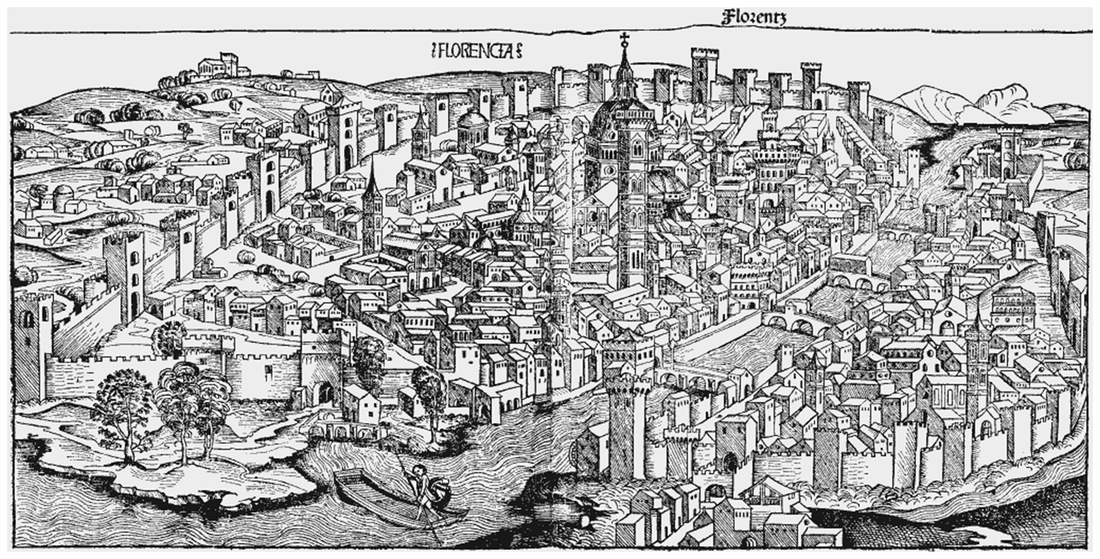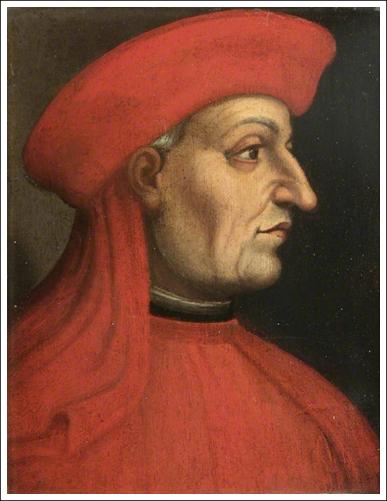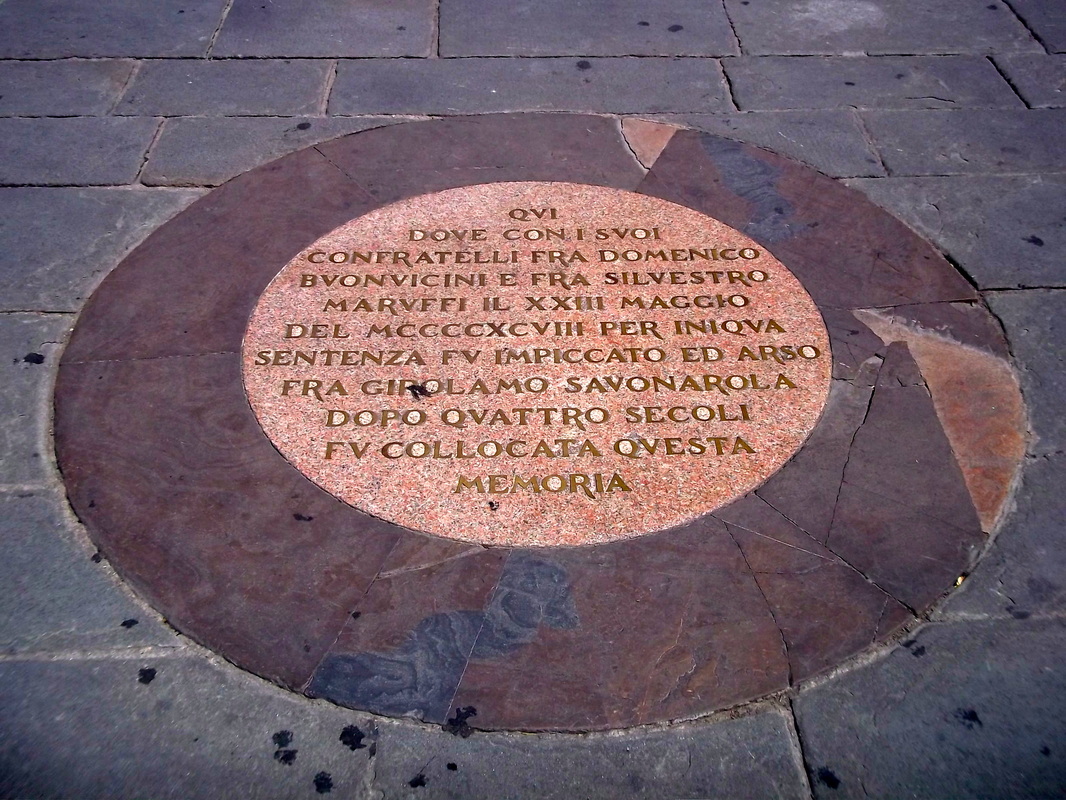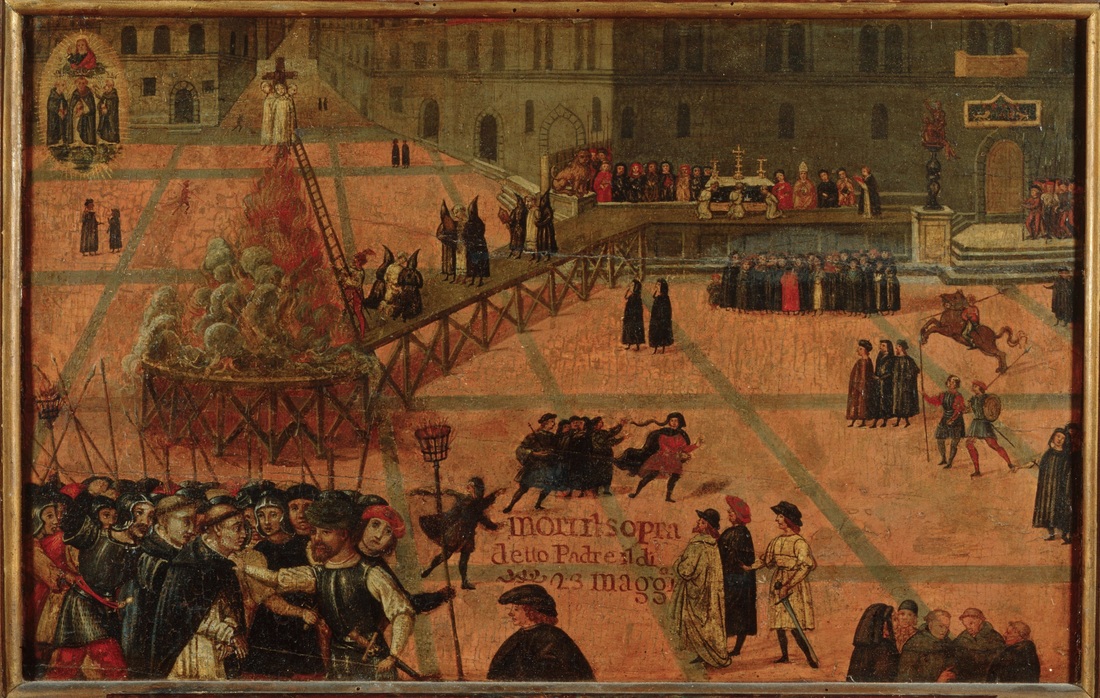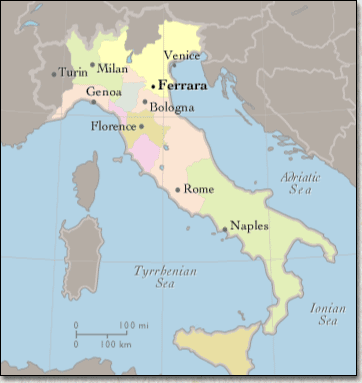Lorenzo de' Medici
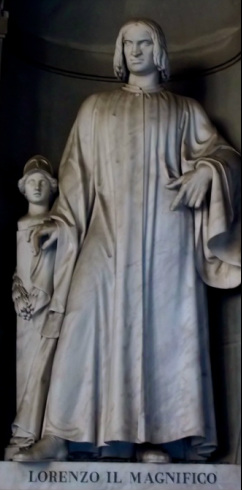
Buongiorno Tutti!
I'm glad you're here! I understand that you've spent the day with my grandfather, Cosimo? I may not be "Pater Patriae", but I still get to retain a pretty cool title: most call me, "Il Magnifico".
Andiamo! That means, "Let's go", in Italian. Andiamo! Journey with me through a few more parts of our city.
Florence truly is the most magnificent of God's cities. I am so grateful to my family lineage for giving me the opportunity to rule over this city. But I needn't brag anymore! I will let Leonardo Bruni, one of the cities chief citizens do the bragging for me:
|
"Florence is of such a nature that a more distinguished or more splendid city cannot be found on the entire earth, and I can easily tell about myself, I was never more desirous of doing anything in my life.…Florence has done and daily continues to do great deeds of honor and virtue both at home and abroad. What about the splendor of the architecture, the buildings, the cleanliness, the wealth, the great population, the healthfulness and pleasantness of the site? What more can a city desire? Nothing at all. What, therefore, should we say now? What remains to be done? Nothing other than to [praise] God on account of His great beneficence and to offer our prayers to God." |
And I couldn't agree more. Praise to God for His great beneficence. And here we are, back at the Piazza della Signoria. It was my grandfather's "political square". Behind the David and the Hercules...that's where our political offices are.
It can be said that Cosimo put Florence "on the map". So, then why am I known as "Il Magnifico"? Much like Napoleon with Paris, you won't see much of my "mark" on the city; the Dome, the bell tower, the bridges, the statues...those were all my grandfather's. But, if Cosimo made the city, I made it great. In metaphor, he made the dough; I put it in the oven! I elevated Florence to the height of diplomatic strength. I made Florence a verb and an adjective: something "Florentine" was associated with wealth and prestige. You don't know this yet, but after my death, Florence, and the Medicis, would never be the same...
It can be said that Cosimo put Florence "on the map". So, then why am I known as "Il Magnifico"? Much like Napoleon with Paris, you won't see much of my "mark" on the city; the Dome, the bell tower, the bridges, the statues...those were all my grandfather's. But, if Cosimo made the city, I made it great. In metaphor, he made the dough; I put it in the oven! I elevated Florence to the height of diplomatic strength. I made Florence a verb and an adjective: something "Florentine" was associated with wealth and prestige. You don't know this yet, but after my death, Florence, and the Medicis, would never be the same...
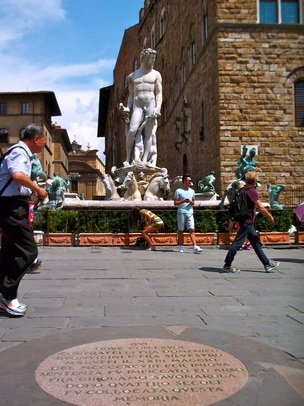
Remember my grandfather's Neptune statue? it's just to the left of the David. In front of the statue, on the ground in the front, you'll see a round "plaque" of sorts, that commemorates the death of a very important religious figure, Girolamo Savonarola.
You might say that I was a bit more "spiritual" than my grandfather, even though he would almost become pope! My son, Giovanni, would become Pope Leo X, but that's a story for a different time. As far as myself, I became sort of a "fanatical follower" of Savonarola. He became my "personal priest", of sorts, and while I was alive, he enjoyed, and employed, a signficant amount of power.
But if you look closely at that plaque, you will see that it bears memory to the death of Savonarola, by hanging and eventual burning.
What happened? Let's find out.
You might say that I was a bit more "spiritual" than my grandfather, even though he would almost become pope! My son, Giovanni, would become Pope Leo X, but that's a story for a different time. As far as myself, I became sort of a "fanatical follower" of Savonarola. He became my "personal priest", of sorts, and while I was alive, he enjoyed, and employed, a signficant amount of power.
But if you look closely at that plaque, you will see that it bears memory to the death of Savonarola, by hanging and eventual burning.
What happened? Let's find out.
The above plaque reads:
In this place, on May 23, 1498, Father Girolamo Savonarola was hanged and then burned after an iniquitous verdict, in the company of his brethren, Fathers Domenico Buonvicini and Silvestro Maruffi. This memorial was put in place four centuries later.
In this place, on May 23, 1498, Father Girolamo Savonarola was hanged and then burned after an iniquitous verdict, in the company of his brethren, Fathers Domenico Buonvicini and Silvestro Maruffi. This memorial was put in place four centuries later.
History is always subject to interpretation, rumor, conjecture and bias, but most people believe that Savonarola simply got too powerful. By 1498, I would be 6 years in the grave (I was Gran Maestro of Florence from 1469 to 1492), so I must assume that the next Medici ruler must have found Savonarola threatening.
The next Gran Maestro of Florence was Piero de' Medici, but most people refer to him as "Pieor the Unfortunate". Didn't I tell you that after my death in 1492 the Medici clan would fall apart? Coupled with a new pope, Rodrigo Borgia from Spain, the two of them developed a paralyzing fear of Savonarola.
Piero was...just a schmuck. Just a screw up. The French author, Alexandre Dumas, famous for his books, The Three Musketeers and The Count of Monte Cristo, would eventually put pen to paper to write a short novel called The Borgias Celebrated Crimes. In it, he describes the rise and reign of the Borgia clan and discusses Piero here:
Piero would eventually invite the French to invade his hated city state-rivals to the South, and because of this, would be exiled from Florence...but we'll come back to that. Let's return to the title of Dumas' book, The Borgias, which suggests that the aforementioned Rodrigo Borgia might deserve more of the blame for Florence's fall than Piero. Rodrigo Borgia became Pope Alexander VI in 1492, and put simply, history remembers him as one of the most ill-equipped, most corrupt and sinful, and most self-serving men ever to fill the papacy. In fact, HBO would make a series called The Borgias in the early 2010s to show the violence, lust, greed, and betrayal of the Spanish family. Check it out if you want.
Let's get back to the story. By the 1490s, Savonarola had developed a mass appeal. He and his fellow Dominican monks would travel around Italy speaking the truth. Scarily enough for Piero and Alexander, that truth would present itself as a direct assault on their leadership.
What did Savonarola say, exactly? Let's examine a few excerpts from his manuscript, Advent Sermon (1493). In my opinion, Savonarola was more important, and did more "constructive damage" to the Church, than Martin Luther ever did! Read below:
Dumas' The Borgias pays particular to the execution of Savonarola. Read here:
Dumas embellishes a bit here. In fact, Savonarola and the Fathers were hanged, and then burned. But regardless, they were killed nonetheless.
The next Gran Maestro of Florence was Piero de' Medici, but most people refer to him as "Pieor the Unfortunate". Didn't I tell you that after my death in 1492 the Medici clan would fall apart? Coupled with a new pope, Rodrigo Borgia from Spain, the two of them developed a paralyzing fear of Savonarola.
Piero was...just a schmuck. Just a screw up. The French author, Alexandre Dumas, famous for his books, The Three Musketeers and The Count of Monte Cristo, would eventually put pen to paper to write a short novel called The Borgias Celebrated Crimes. In it, he describes the rise and reign of the Borgia clan and discusses Piero here:
- Florence, although she had preserved the name of a republic, had little by little lost all her liberties, and belonged in fact, if not by right, to Piero dei Medici. The son, unfortunately, was far from having the genius of his father: he was both ignorant of political affairs and haughtily insolent [rude] in his behavior to those who had made them their study. Added to this, he was an ardent lover of pleasure, passionately addicted to women, incessantly occupied with bodily exercises that should make him shine in their eyes, above all with tennis,
Piero would eventually invite the French to invade his hated city state-rivals to the South, and because of this, would be exiled from Florence...but we'll come back to that. Let's return to the title of Dumas' book, The Borgias, which suggests that the aforementioned Rodrigo Borgia might deserve more of the blame for Florence's fall than Piero. Rodrigo Borgia became Pope Alexander VI in 1492, and put simply, history remembers him as one of the most ill-equipped, most corrupt and sinful, and most self-serving men ever to fill the papacy. In fact, HBO would make a series called The Borgias in the early 2010s to show the violence, lust, greed, and betrayal of the Spanish family. Check it out if you want.
Let's get back to the story. By the 1490s, Savonarola had developed a mass appeal. He and his fellow Dominican monks would travel around Italy speaking the truth. Scarily enough for Piero and Alexander, that truth would present itself as a direct assault on their leadership.
What did Savonarola say, exactly? Let's examine a few excerpts from his manuscript, Advent Sermon (1493). In my opinion, Savonarola was more important, and did more "constructive damage" to the Church, than Martin Luther ever did! Read below:
- Thus it is that no more good prelates [church leaders] are to be found in the Church. Seest thou no that they do all things amiss?... the cure of souls is no longer their concern; they are content with the receipt of revenue… This is the new Church, no longer built on living rock, namely, of Christians steadfast in the living faith and in the mold of charity; but built of sticks, namely, of Christians dry as tinder for the fires of hell…
- Go thou to Rome and throughout Christendom...There thou seest the great prelates with splendid mitres [headdress] of gold and precious stones on their heads, and silver crosiers [an ornamental staff or "walking stick"] in hand; there they stand at the altar, decked with fine [fabrics made of silver and gold], chanting those beautiful vespers [prayers] and masses...
- Men feed upon these vanities and rejoice in these pomps...In the primitive Church the chalices [cups from which the holy wine is drunk] were of wood, the prelates of gold; in these days the Church hath chalices of gold and prelates of wood. These have introduced devilish games among us; they have no belief in God, and jeer at the mysteries of our faith!
- What doest Thou, O Lord? Why dost Thou slumber? Arise, and come to deliver thy Church from the hands of the devils, from the hands of tyrants, the hands of iniquitous [morally wrong] prelates. Hast Thou forsaken Thy Church? Dost Thou not love her? Is she not dear unto Thee? O Lord, we are become the despised of all nations;...The only hope that now remains to us, is that the
sword of God may soon smite earth.
Dumas' The Borgias pays particular to the execution of Savonarola. Read here:
- The first measure Alexander used against the growing power of Savonarola was to declare him heretic and as such banished from the pulpit...[He then issued] a mandate forbidding the faithful to attend at Savonarola's sermons. After this mandate, any who should hear the discourses of the excommunicated monk would be refused communion and confession; and as when they died they would be contaminated with heresy.
- The rumors [of Alexander's actions] reached the ears of Father Francesco, [the head bishop of the Florentine region]...He proposed to try Savonarola with the ordeal of fire. [Savonarola and his chief followers were be burned until the Lord intervened to save them.]
- [Piero] ordered that the strange duel should include Savonarola and Fathers Domenico Bonvicini and Andrea Rondinelli; ten of the citizens were to arrange all details; the day was fixed for the 7th of April, 1498, and the place the Piazza del Palazzo...Bonvicini declared that he was ready to walk through the fire, holding nothing in his hand but a crucifix,...but at that very moment a storm which had long been threatening brake over Florence with such fury that the faggots [sticks] which had just been lighted were extinguished by the rain, leaving no possibility of their rekindling.
- On the 23rd of May, the fire which had been promised to the people before was a second time prepared on the Piazza del Palazzo, and this time the crowd assembled quite certain that they would not be disappointed of a spectacle so long anticipated. And towards eleven o'clock in the morning, Girolamo Savonarola, Domenico Bonvicini, and Silvestro Maruffi were led to the place of execution, degraded of their orders by the ecclesiastical judges, and bound all three to the same stake in the center of an immense pile of wood. Then the bishop Pagnanoli told the condemned men that he cut them off from the Church.
- At this moment one of the Arrabbiati, a personal enemy of Savonarola, broke through the hedge of guards around the scaffold and snatched the torch from the executioner's hand and himself set fire to the four corners of the pile. [The three Dominican friars were burned to death].
Dumas embellishes a bit here. In fact, Savonarola and the Fathers were hanged, and then burned. But regardless, they were killed nonetheless.
|
On May 23, 1498, Savonarola was killed. And as I mentioned earlier, this was just one of the downfalls of the Medici clan. Let's conclude the story.
Piero had developed increasing animosity with the Napoli family to the South. Coupled with a born-hatred of the Venitians, Piero's enemies abounded throughout the Italian peninsula. But it was the allowance of the French to invade the South via Florence that really destroyed our family's legacy. French forces didn't "destroy" Florence, per se, but they did bring an element of fear and unsettling to the once great city. Dumas continues the story below: |
- [Back story: The French had desired the northern territories of Italy for years. They also laid hereditary and familial claim to the Naples region of the south. Originally], Piero de' Medici had undertaken to hold the entrance to Tuscany [North, Central Italy] against the French. However, when he saw his enemy coming down from the Alps, he felt less confident about his own strength, and demanded help from the pope;...This was the first occasion on which the Italians found themselves in contact with savage foreigners [and] looked upon it as simply a mortal conflict...
- Piero de' Medici, in spite of his name and influence, was in the eyes of the French nobility, nothing more than a rich merchant, with whom it would be absurd to stand upon any very strict ceremony....The [French] king demanded that [the region of] Sarzano [west of Florence] should be given up to him: to this Piero dei Medici at once consented.
- Then the conqueror, wishing to see how far the ambassador of the magnificent republic would extend his politeness, replied that this concession was far from satisfying him, and that he still must have the keys of Pietra Santa, Pisa, Librafatta, and Livorno [other regions in Northern Italy]. Piero saw no more difficulty about these than about Sarzano, and consented on Charles's mere promise by word of mouth to [retire from these regions after] he had achieved the conquest of Naples...Piero agreed, and the French army, led by the grandson of Cosimo the Great and the son of Lorenzo the Magnificent, continued its triumphal march through Tuscany. The same day the Medici were declared traitors and rebels, and ambassadors [from Florence] were sent to the King of France...
- Everything went well for the triumphant march of Charles: the gates of towns opened of themselves at his approach, his enemies fled without waiting for his coming, and before he had fought a single battle he had won for himself the surname of Conqueror.
- [Pope Alexander's son, Caesar Borgia, focused] all the force of his genius to restore the league of Italian princes that had been broken by the actions of Piero dei Medici. [For his actions, Piero was exiled from Florence in 1494, and there wouldn't be a Medici in power in Florence for another two decades...]
Click below to head back to the main "Leaders of Men" page and grab hold to another "leader" who'll show you the greatness of the Italian Renaissance.
